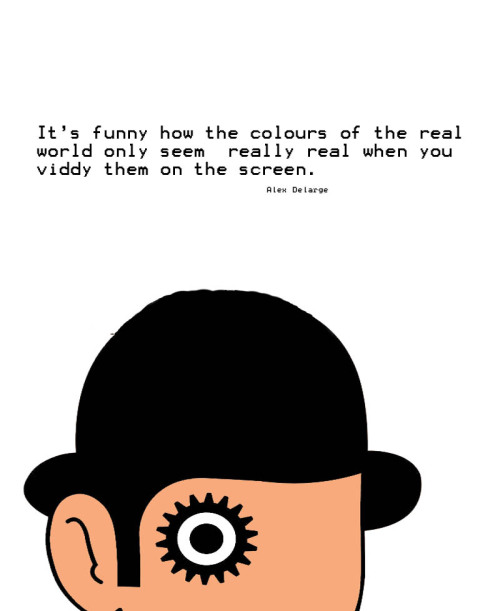
"Burgess gave more than one explanation for the origins of the title. In a prefatory note to A Clockwork Orange: A Play with Music, Burgess wrote that the title was a metaphor for "...an organic entity, full of juice and sweetness and agreeable odour, being turned into an automaton."" -Wikipedia
Now I can't remember when Alex says the above quote in the movie, but I can take an educated guess that it is during his Ludovico "Treatment" when he is forced to watch horrendous, "ultra-violence" on a giant screen for hours at a time.
If you are familiar with the story, Alex DeLarge is pretty deranged by most people's standards (But you still kind of root for him. At least I hope you do, otherwise I am a giant weirdo). Anyway, he is a young man living in a near-future England that gets into a lot of mischief with his "droogs". They beat people up, rape women, and don't go to class, etc. They're bad news. But only until Alex playfully murders an elderly woman does he get arrested and finally sent to prison.
This is when his Ludovico Treatment starts. Now, the images that are on the screen are things that he's use to, he has done a lot of these crimes. But they greatly disturb him and eventually, forcefully and psychologically "change" his whole nature (But of course it doesn't really change anything, he just doesn't want to suffer the physical consequences of participating in the ultra-violence anymore). This is the exact same point that Baudrillard makes (I think??? I hope I understood it. Now I am uncertain). But the comparison at least shows how Alex couldn't recognize how disturbing his actions really were until he had the media mirror it back to him.
I added the quote from the author, Anthony Burgess, just because I liked the juxtaposition of nature and machines. The failure of the Ludivico Treatment shows that you can't control nature and you can't really give it certain characteristics. Some people in the movie are pretty well-adjusted, others are not. And I think human nature and nature nature are alike in that way.
Other elements in the movie can be tied back to Toxic Discourse. We're familiar with Buell's topoi by now, I can think of two that are in the movie. Gothicization, fo'sho. England is a dump! Nature is mostly removed from the story and the cinematography shows a grungy, grey, twisted city.
Also, I kind of feel David & Goliath going on here. I told you earlier that I care about Alex, and I think it's him versus "the system". I don't know though, his parents seem well-adjusted, and their eventual "Alex replacement" seems okay. I just think he is a victim of his times and Virgil would point me out to Dante in Hell for my sympathy.
But since the story does take place in the future, it argues against good ol' Pastoral perception of nature. In fact, I think the movie is just bleak all around; the past isn't thought of as better, the future doesn't seem that appealing, and nothing changes in the future. So, eh, yeah. Not sure what that means.
I couldn't wait until next week to post this, so sorry I did two this week. But I want to be a good student and have more time to dedicate for my paper :D
This comment has been removed by the author.
ReplyDeleteThat's a fascinating read, for sure. It's been a while since I tackled it, but the way to go about that text is through its particular version of dystopia. We side with Alex often because we feel the system in which he lives in a sense has provided for his violent behavior. It's an indictment of staid English culture as much as it is of Alex's dreadful acts. I do think you could employ Baudrillard here (though you may want to take another look at what Baudrillard has to say about simulation. Does it really help us to see the "real" violence, as you suggest there?)
ReplyDelete